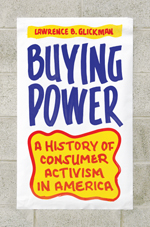Pure Food and Financial Protection

Many of the nation’s financial problems in the last few years have at least some of their roots in the mismanagement of personal finance. Some blame the fiscal hubris of consumers and speculators who bit off more than they could chew. Others blame industry, claiming that many corporations and lenders have made it a common practice to dupe consumers into making unwise investments—from mortgage brokers failing to inform their clients of the full terms of their loan repayment plans, to volatile interest rates and hidden fees on credit card debit. Yet others blame both—while a public consumer culture that encourages irresponsible spending may be partially to blame, the recession has also provided ample evidence on which to base a solid argument for increased consumer protection standards against predatory corporate practices as well.
In a recent article for the American Prospect, Larry Glickman author of Buying Power: A History of Consumer Activism in America discusses Barak Obama’s proposed Consumer Financial Protection Agency (CFPA) and the history of government policy designed to protect the consumer. From the The Pure Food and Drugs Act of 1906, to the Truth in Lending and Fair Labeling and Packaging Acts of the 70s, Glickman’s article demonstrates how consumer protection legislation has inevitably provoked a strong reaction from the right but nevertheless enjoys a fair amount of public support once enacted, and according to Glickman, for good reason.
Read the article on the American Prospect website or find out more about Glickman’s book.